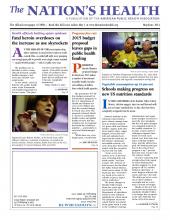People with chronic diseases and who have trouble affording enough food are more likely to skip their medications, found a recent study.
Published in the April issue of the American Journal of Medicine, the study found that more than 23 percent of chronically ill study participants reported skipping needed medications due to cost, nearly 19 percent reported food insecurity and 11 percent reported both. Overall, one in three chronically ill study participants were unable to afford food, medication or both. Those who reported food insecurity, or being unable to consistently afford enough food, were significantly more likely to report cost-related medication underuse. Both cost-related medication underuse and food insecurity are associated with adverse health outcomes. The study was based on nearly 10,000 adults taking part in the National Health Interview Survey who reported chronic illness.
The high overall prevalence of food insecurity and cost-related medication underuse highlight how difficult successful chronic disease management in the current social environment is,” said lead study author Seth Berkowitz, MD, a fellow in general medicine and primary care at Massachusetts General Hospital and Harvard Medical School. “These findings suggest residual unmet needs for food-insecure participants and thus have clear implications for health policy.”
The study also found that people experiencing cost-related medication underuse and food insecurity were more likely to be Hispanic, black, have no medical home and have more chronic medical conditions. Poverty was more common among participants experiencing food insecurity, while lack of health insurance was more likely among those unable to afford enough medicine.
However, public assistance programs made a positive difference. The study found that participants enrolled in Medicaid experienced a lower rate of cost-related medication underuse than those with private insurance. Also, survey respondents participating in the Special Supplemental Nutrition Program for Women, Infants and Children, or WIC, experienced a lower rate of both cost-related medication underuse and food insecurity. The findings suggest that such programs offer significant “spill-over effects” that can help people afford either enough food or medication, Berkowitz said.
“A study like this highlights the inter-relatedness between the social determinants of health and the health care system,” he told The Nation’s Health.
The study concluded that interventions aimed at vulnerable populations that may face “treat or eat” choices could yield substantial health gains.
Berkowitz said that while he and his study colleagues expected to find financial trade-offs between having enough food and taking enough medication, the “fact that one in three (were unable to afford food, medication or both) was a bit of a surprise.” He also described the possible impact of the Affordable Care Act as a “mixed bag.” For example, while study participants with Medicaid coverage fared better, only about half of states are taking advantage of the health reform law’s Medicaid eligibility expansion. There is also concern that people will not always choose the best insurance plans for their health and medication needs, Berkowitz added.
“This is an issue the health care delivery system needs to be aware of,” he said. “It needs to be approached in a systematic way and not be just another set of questions doctors ask patients without having a clear way of doing something about it.”
For a copy of the study, visit www.amjmed.com/article/S0002-9343%2814%2900030-8/fulltext.
- Copyright The Nation’s Health, American Public Health Association









